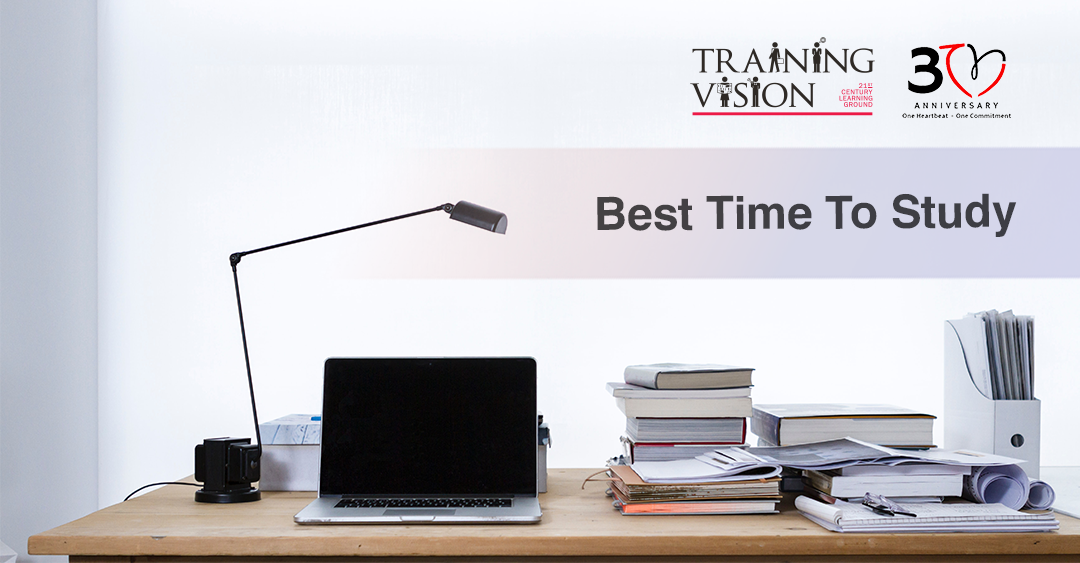One of the basic problems of students is planning out their daily schedules. Study habits tend to be a challenge to establish because most of us believe that it depends upon the person. It is a personal decision to make and students do not have the same time that is favourable to their productivity. There are students who prefer to study early in the morning and there are those who are keener to study at night.
As challenging as it is, there are students who are also having a hard time finding out which is the best time for them to study. While there are some who would just shrug it off and would choose to study whenever they feel like it, having a fixed schedule for studying will definitely help you make the most out of your studies and also of your time.
What is the best time to study?
Science has proven that a person’s critical thinking and analytical skills are more effective between 2 PM to 5 PM. It is said that during these times, the brain can be very proficient at assimilating and processing any new information it acquired. With that being said, you might think that those times are the most effective way of studying since it is backed by science. You’d be surprised to know that’s not always the case. Different students prefer to study at different times of the day and still yield favourable results.
Studying in the morning
Most students across the globe are keen to wake up early in the morning and study after they finish their daily morning routine. In fact, there are those who include studying in their morning routine. Fresh from good night’s sleep, the brain is refreshed and therefore can absorb more information. Here are some of the benefits of studying in the morning:
- Your brain is refreshed from sleep and thus can absorb more information
- Natural lighting helps you be alert
- Your sleep schedule is not being disrupted
- It is easier to study in groups because everyone is available.
Studying in the afternoon
Afternoon studies are excellent for some students, as they can take advantage of the science of time mentioned above. It is during this time that the brain is also quite active and more efficient at integrating the new information it receives with the information that it already knows. The biggest advantage of this for students who prefer to study in the afternoon is that they can easily make sense of the information they learned previously.
Another advantage of studying in the afternoon is that help is available whenever you get stuck in the middle of your study session. There might be questions that you’d encounter along the way, and your trainers and professors are available to answer them.
Studying at night
Ah the night learners, a.k.a. The Night Owls. The only disadvantage of the night schedule is sleep disruption, and with that aside, a lot of students are at their full potential at night. There are lots of advantages that studying at night. There is more peace and quiet during the night when most people are asleep, and therefore there are minimal distractions. The mind is also clearer in the evenings for creative thinking plus, sleeping after studying can help consolidate information and improve recall.
Science has also suggested that studying at the time when you are the most tired helps the brain retain a higher concentration of new skills (e.g. speaking a foreign language, using Adobe Photoshop, etc.). It is called sleep-learning, and this happens during slow-wave sleep when the process of memory consolidation is at its best and the brain is receiving the restoration and reactivation it needs while it rests.
So, can you learn anything while you sleep? The simple answer is yes.
Different times of study present different benefits. Your memory, alertness, and critical thinking skills can be at different levels during the day, and clearly, the best time to do it depends on your lifestyle, and also the nature of your learning. If you do not have a schedule for study time yet, or you are still trying to find out which is the best time to study, you may want to try studying at different schedules and see which one is best for you. Once you find it out, stick to it because consistency can also help your mind and your body adapt to the routine and be in your best condition to study during your time schedule.
Ways to study effectively
While finding your study schedule proves to be a challenge, studying efficiently can be more challenging. In this era of social media, you are presented with a lot of digital distractions that can take your concentration away from what you’re doing. So how can you maximise your study time? What can you do to study more effectively and efficiently?
Here are some tips backed by research!
Study less, learn more.
Your smartphone is a catalyst of distraction—it forces you to multitask between the things that are important and the things that you can actually do at a later time. Multitasking sounds like a formidable skill until you discover that it is not so efficient because while you switch from one task to another, your brain needs to restart and refocus. There is so much time wasted.
Imagine, if you allotted yourself 3 hours to study but you check your social media and chat with your friends every so often during that period, your actual study time is not 3 hours, but less. The amount of work you could have accomplished in 3 hours have you been focusing on just one task is not the same as the amount of work you accomplished while working with other things.
Therefore, to maximise your study time, avoid multitasking and spend fewer hours studying. Study for shorter periods but with higher intensity.
Forget your old learning techniques—most of them are ineffective.
There are study habits that students have been doing ever since the beginning of time that take a lot of time but are ineffective. If you are studying for long periods of time, reading and rereading, or reviewing your notes, you have to stop them right now. They prove to be just an illusion of mastery—it makes you familiar with the ideas and information but they are not designed for long-term learning and so you forget them a week later.
Perform pre-testing.
Practice answering questions. Even if you do it incorrectly prior to learning the content, your future learning is enhanced. Research shows that doing a pre-testing can lead to stronger memory than spending the amount of time studying.
Colour-coded notes.
TikTok is packed with tutorials and demo videos on effective ways to study, and you’ll notice that most of these young students are using colour-coded notes in their calligraphic handwriting. Well, you do not need to have good handwriting for this, but you might want to get yourself a nice set of highlighters or coloured pens and sticky notepads. A recent study concluded that colours can improve your memory performance, and the same study also showed that warm colours (e.g. red, yellow) can create a positive and motivating learning environment and it can help you to have a positive perception of the content and interact more with your learning materials.
Not sure how to colour your notes? You can use the following guidelines:
- Key points should be highlighted/written in red
- Important information should be highlighted/written in yellow
- Organise the topics by colour
- Avoid using colours for everything–just highlight the important information
This way, it’ll be easier for you to see which information is important, plus you can have a more organised (and somewhat aesthetic) notebook.
Exercise before studying
Increased energy levels are proven to kick-start your brain function which helps in improving your memory and cognitive performance. You won’t always be in the mood to study—sometimes it will be hard to find the motivation to do so. It happens to everyone, and while it’s okay to feel slumped sometimes, you may want to find that motivation to continue your study habits. Consider adding exercise habits to your study routine. It can be a 20-minute workout at home, brisk walking around the neighbourhood and just about anything physical that can get your heart rate pumping.
This habit can also help release endorphins (the happy hormones) which can improve your mood and reduce stress levels.
No one wants to spend all of their time studying. Therefore, you should learn techniques that can effectively help maximise your study time. Establishing a study routine sounds like a boring task, but with the tips mentioned above, you can have a meaningful (and perhaps a more fun way) of studying and acquiring information.
So, create a study routine, stick to it, get enough sleep, and do not forget to be kind to yourself as well. At the end of the day, your well-being is also important and being hard on yourself won’t allow you to accomplish anything.
Make the most out of your study habits and sign-up for one of our courses.
Acquire the relevant skills and knowledge in SEO, SEM, content marketing, data analytics and customer management by signing up for Professional Diploma in Digital Marketing and Campaign Strategy. We are in partnership with DMI (Digital Marketing Institute), a global leader in digital marketing courses.
You can also sign-up for our Advanced Diploma in Cyber Security (ADCS) if you are computer and tech-savvy. Earn a deep understanding of cyber security and boost your technical foundation. In partnership with EC-Council, this course will also allow you to gain EC-Council certifications upon completion of the programme and passing the certification exams.
Are you about to take the next step of your career ladder but not quite sure how to become a good leader? Our Leadership and People Management programme will equip you with the right skills and enhance your leadership capabilities. This course provides a leadership development roadmap best for those who aspire to assume leadership roles.








